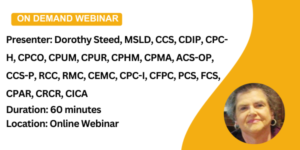Conference Material (Password Required)
What is the purpose of modifiers?
How do I know when to apply them and which one I should use?
What are the rules for how to sequence modifiers after your CPT or HCPCS codes?
If you have ever tried to figure out the answers to any of these questions, you will want to attend this session. During our time together, I will discuss both CPT and HCPCS modifiers. I will define what a modifier is, and what it does. I will also discuss the circumstances when certain modifiers should not be used.
Have you ever wondered when modifier 25 is appropriate and when it isn’t? I think every coder has at one time or another. Do you know when to use modifier 51 and when not to? Modifier 59 can also be difficult to know when to use it, and when using it might be inappropriate and/or when it may put your claim at risk of being rejected by the payers.
Have you ever wished you had a cheat sheet for modifiers? I have created some cheat sheets for some of the modifiers that seem to confuse many of us, specifically about when to use them and when they might not be appropriate. As a part of this presentation, I will share with you the cheat sheets that I have put together for myself and my students for the following modifiers – 25, 26, 58, 59, 78, 79, GV, GW, and TC.
Join me for a deeper dive into modifiers, and you will have a better understanding of when you should (and shouldn’t) use certain modifiers.
Learning Objective:
- What is a modifier?
- Modifier sequencing
- When to use and not use specific modifiers
- Identify E/M modifiers
- Learn how modifiers affect the postoperative period
- Hear about the reimbursement differences when modifiers are used
- Review current documentation to determine changes that need to be made
- Learn about HCPCS modifiers available
Areas Covered in the Session:
- Modifiers
- What is Modifier?
- Novitas
- NCCI Policy manual
- Sequencing
- Pricing/Payment – 22 ,26 , 50, 51, 52, 53, 54, 55, 59, 78, 79, AA, AD, TC, QK, QW, QY
- Informational – El-E4, FA-F9, LC, CD, LT, RT, RC, TA-T9
- Types and classifications of modifiers
- CPT modifiers:
- Modifier 22 , 24 ,25 ,26,
- Modifier 50 , 51 , 52 ,53 , 54/55 , 57 , 58
- Modifier 59
- Modifier 76 , 77 , 78
- Modifier 79
- Modifier 91
- HCPCS modifiers:
- Modifier FS
- Modifier FT
- Therapy modifiers (GN , GO , GP )
- Modifier GV and GW
- Modifier JW , TC & decision tree
- Modifier XE, XP, XS, XU
Suggested Attendees:
- Billers
- Coders
- Physicians
- Nurses
- Administrators
- Managers
- Claims Adjusters
- Surgery Schedulers
- Reimbursement Staff
Presenter Biography:
Julie Davis, CPC, COC, CRC, CPMA, CPCO, CDEO, Approved Instructor has 20+ years of experience in coding, auditing, compliance, documentation improvement, consulting, and teaching. Her background includes coding and auditing for several large multispecialty medical groups, managing coders, auditors and physician educators for several national consulting companies and multispecialty medical groups, and consulting for national clients. She has created a curriculum and taught a variety of coding courses, for clients, for private classes and for AAPC. She is currently a member of the AAPC Documentation Advisory Committee. She has also held officer positions in several AAPC Local Chapters in both California and Colorado.

